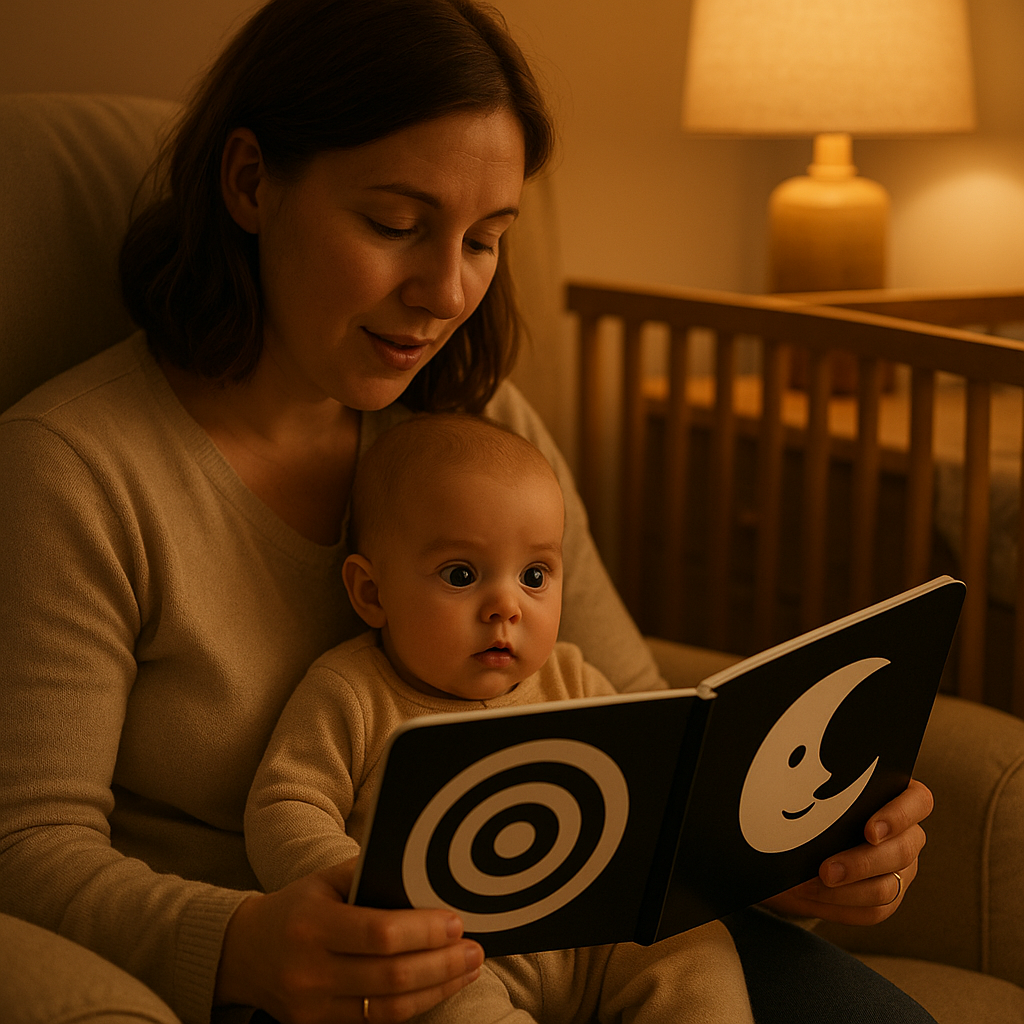Tonight’s cuddle-and-book ritual could expose your baby to one million additional words by kindergarten—no flash cards needed. Regular reading significantly boosts vocabulary, acting as a cognitive catalyst for language acquisition. Bedtime stories foster neural plasticity, calm stress hormones, and strengthen family bonds in brief daily sessions. By nurturing language, sleep quality, and emotional intelligence, this simple practice lays a foundation for lifelong learning. Try reading a story tonight to spark your baby’s brain. This article explores how stories enhance vocabulary, improve sleep, and build cognitive and social skills, with practical tips for all families. Let’s learn more:
- How Exactly Does a Bedtime Story Rewire Your Baby’s Brain?
- Can Nightly Storytime Improve Both Sleep Quality and Brain Growth?
- Which Cognitive and Social Skills Get a Head-Start from Bedtime Stories?
- How Do I Choose Books and Techniques That Supercharge Brain Gains?
- What If Print Books, Time, or Literacy Feel Like Barriers?
- Your Top Questions, Answered
- Final Thoughts: Why One Story Tonight Shapes Tomorrow’s Brain
How Exactly Does a Bedtime Story Rewire Your Baby’s Brain?
Bedtime stories activate multisensory brain regions, enhancing cognitive development. Toddlers that read to five nights a week show increased activity in areas tied to sound-to-image mapping, crucial for reading comprehension and imagination.
Picture books introduce up to twice as many unique words as daily talk, strengthening neural connections and narrowing the “word gap”.
Newborns recognize stories heard in utero, as shown in a 2013 Science study, proving auditory memories from before birth Womb Word Recognition. Rhythmic reading engages predictive pathways, fostering neural plasticity and priming comprehension. Try pointing to pictures while reading to boost engagement.

Can Nightly Storytime Improve Both Sleep Quality and Brain Growth?
Yes. Nightly story-time enhances sleep quality and supports brain development.
A bath-book-bed routine reduced sleep onset by 37%, lowering cortisol and promoting melatonin for brain-building sleep stages.
Swapping screens for print books 30 minutes before bed protects eyes from blue light, per AAP guidelines, maintaining circadian rhythms and neural plasticity Screen Time Alternatives.
In many cases, a calmer limbic system reduces night wakings, aiding memory consolidation. Try a soothing story before bed to ease your baby into sleep. —a key theme in How Sleep Boosts Your Baby’s Brain.
A calmer limbic system means fewer night wakings, a finding echoed in How to Create a Sleep Routine for Better Baby Brain Health.
Which Cognitive and Social Skills Get a Head-Start from Bedtime Stories?
Bedtime stories accelerate a range of cognitive and social skills, fostering lifelong learning. Research highlights these key benefits:
- Language Acquisition: Daily readers know up to 300 more words by 18 months, speeding speech milestones and enhancing language acquisition.
- Memory Consolidation: Repeated stories strengthen hippocampal circuits, boosting recall and neural plasticity. See Why Naps Boost Your Baby’s Memory for related insights.
- Emotional Intelligence: Characters’ emotions train empathy and self-regulation, per a 2019 Frontiers in Psychology study, fostering social-emotional growth Storybooks Promote Empathy.
- Attention Span: Page-turn anticipation builds focus, countering screen media’s rapid pace, supporting executive function development.
How Do I Choose Books and Techniques That Supercharge Brain Gains?
Selecting the right books and techniques maximizes cognitive benefits for your baby. These evidence-based strategies foster language acquisition, sensory engagement, and neural plasticity:
- Individual-label books (e.g., “Sam the Dog”): According to research, longer gaze times, enhancing attention and focus.
- Expressive voices: Varied intonation boosts phonemic awareness, per a 2018 Reading Research Quarterly study, strengthening language processing Voice and Reading.
- Tactile or lift-the-flap pages: Engage multiple senses without overstimulation, supporting sensory integration.
- Bedtime shelf of 5–7 soothing titles: Prevents delays and builds routine, fostering calm transitions to sleep.
- Gentle, rhythmic themes: Mimic lullabies, promoting relaxation and cognitive consolidation.
What If Print Books, Time, or Literacy Feel Like Barriers?
Bedtime stories are accessible to all families, despite obstacles. These research-backed solutions ensure cognitive and language benefits for every baby:
- E-ink readers: Sleep-safe and effective; touch-screens reduce interaction by 33%, per a 2019 Pediatrics study, so sit side-by-side and maintain conversation.
- Multilingual homes: Alternate languages nightly; any familiar tongue enhances neuroplasticity.
- Low-literacy parents: Use audio picture books or describe images (“picture-walk”) to foster vocabulary, maintaining strong language gains.
- Neuro-diverse babies: Simple visuals, repetition, and sensory tools (e.g., soft toys, rocking) ensure stress-free engagement.
Your Top Questions, Answered
-
When should I start reading to my baby?
From day one. The AAP endorses literacy promotion at the first well-baby visit. Even sleepy newborns soak up rhythmic language. -
How long should bedtime stories last?
Aim for 8–15 minutes or two short books. Follow your baby’s sleepy cues over the clock. -
Is it helpful to read while my baby sleeps?
It’s a bonus, not a substitute. Light-sleep infants still process sound, yet awake, interactive reading delivers maximum benefits. -
Which is better—print or screen?
Print wins for bonding and sleep. If screens are unavoidable, enable night-shift mode and keep dialogue flowing. -
What if my baby squirms or chews the book?
Let them. Micro-sessions add up, and sensory exploration builds positive book associations.
Final Thoughts: Why One Story Tonight Shapes Tomorrow’s Brain
A nightly bedtime story nurtures your baby’s cognitive and emotional growth with minimal effort. Reading aloud strengthens neural plasticity, fostering language acquisition, executive function, and emotional intelligence. A dim lamp, your warm voice, and a simple board book deliver rich vocabulary, reduce stress hormones, and build secure bonds.
Try a soothing board book tonight and align with optimal bedtimes using Baby Sleep Needs by Age. By supporting sensory engagement and emotional growth, your voice paves neural pathways for tomorrow’s curious, confident reader.